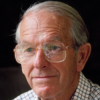Frederick Sanger

Frederick Sanger
Frederick Sanger OM CH CBE FAAwas a British biochemist who won the Nobel Prize in Chemistry twice, one of only two people to have done so in the same category, the fourth person overall with two Nobel Prizes, and the third person overall with two Nobel Prizes in the sciences. In 1958, he was awarded a Nobel Prize in chemistry "for his work on the structure of proteins, especially that of insulin". In 1980, Walter Gilbert and Sanger shared half...
NationalityEnglish
ProfessionScientist
Date of Birth13 August 1918
believe english-scientist enjoyed felt interested primarily riches strongly
I believe that we have been doing this not primarily to achieve riches or even honour, but rather because we were interested in the work, enjoyed doing it and felt very strongly that it was worthwhile.
english-scientist owe taught
It was Neuberger who first taught me how to do research, both technically and as a way of life, and I owe much to him.
avoiding basic cambridge english-scientist far possible remained research teaching
I had remained in Cambridge concentrating only on basic research and avoiding as far as possible teaching or administrative responsibilities.
english-scientist fellowship held medical memorial research since staff
From 1944 to 1951 I held a Beit Memorial Fellowship for Medical Research, and since 1951 I have been on the staff of the Medical Research Council.
advanced course degree english-scientist further obtaining remained surprised taking teachers
After taking my B.A. degree in 1939 I remained at the University for a further year to take an advanced course in Biochemistry, and surprised myself and my teachers by obtaining a first class examination result.
basis develop english-scientist living matter medical scientific seemed understand
It seemed to me that here was a way to really understand living matter and to develop a more scientific basis to many medical problems.
respect brother years
Influenced by him, and probably even more so by my brother Theodore a year older than me, I soon became interested in biology and developed a respect for the importance of science and the scientific method.
father careers medicine
Initially I had intended to study medicine, but before going to University I had decided that I would be better suited to a career in which I could concentrate my activities and interests more on a single goal than appeared to be possible in my father's profession.
home peaceful married
I was married to Margaret Joan Howe in 1940. Although not a scientist herself she has contributed more to my work than anyone else by providing a peaceful and happy home.
understanding fascination research
And indeed this theme has been at the centre of all my research since 1943, both because of its intrinsic fascination and my conviction that a knowledge of sequences could contribute much to our understanding of living matter.
atmosphere acid
In this atmosphere I soon became interested in nucleic acids.
mother daughter support
Until 1943 I received no stipend. I was able to support myself as my mother was the daughter of a relatively wealthy cotton manufacturer.
father believe two
When I was young my Father used to tell me that the two most worthwhile pursuits in life were the pursuit of truth and of beauty and I believe that Alfred Nobel must have felt much the same when he gave these prizes for literature and the sciences.
teacher years class
After taking my B.A. degree in 1939 I remained at the University for a further year to take an advanced course in Biochemistry, and surprised myself and my teachers by obtaining a first class examination result.